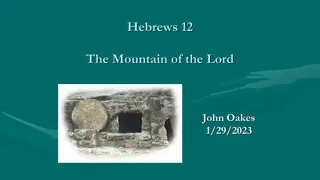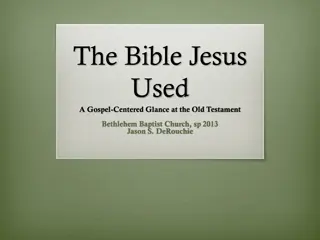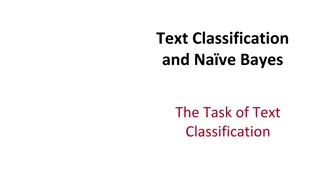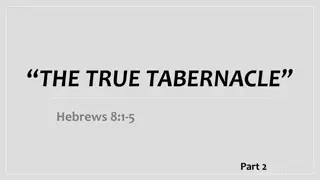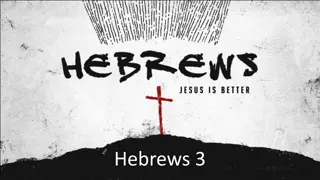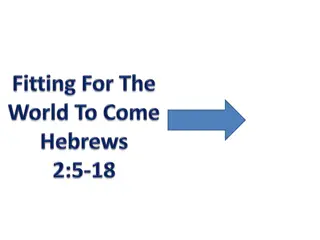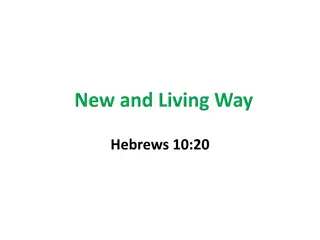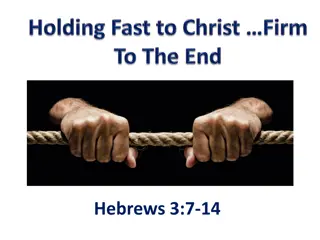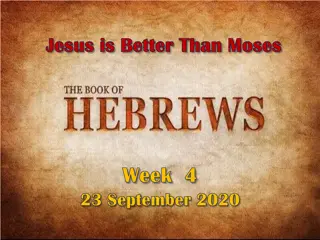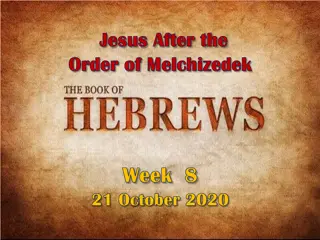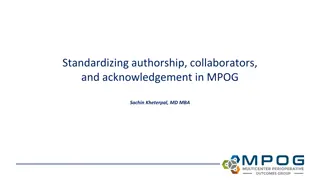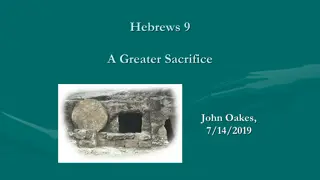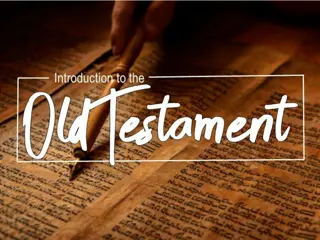Insights into the Book of Hebrews: Authorship, Canonicity, and Themes
The Book of Hebrews stands out as a unique piece in the New Testament, known for its absence of typical epistolary elements and its rich theological content. Questions concerning its authorship, canonicity, and themes have intrigued scholars and believers alike. Despite uncertainties surrounding its origin, the book has been widely accepted and valued for its portrayal of Jesus as the mediator of a superior covenant. Its message addresses second-generation Hebrew Christians who were tempted to revert to Judaism, emphasizing the fulfillment of Old Testament covenants.
Download Presentation

Please find below an Image/Link to download the presentation.
The content on the website is provided AS IS for your information and personal use only. It may not be sold, licensed, or shared on other websites without obtaining consent from the author. Download presentation by click this link. If you encounter any issues during the download, it is possible that the publisher has removed the file from their server.
E N D
Presentation Transcript
What is Hebrews? Not an epistle (similar to 1 John) No greeting, addressees, blessing But I urge you, brethren, bear with this word of exhortation, for I have written to you briefly. (13:22) Sermon/homily (cf. Acts 13:15-41)
Who Wrote Hebrews? Who the author of the epistle is God truly knows (Origen of Alexandria, ca. 185-253) Pauline theology but someone else s phraseology [Sermon notes?]
Who Wrote Hebrews? It is unsigned Suggestions: Paul, Luke, Silas, Barnabas, Peter, Apollos, Silvanus, Philip, Jude, Clement of Rome, Aquila and/or Priscilla, et al Not Timothy (see 13:23)
Who Wrote Hebrews? What we know about the author: Well-trained in Greek (large vocabulary, polished style) Well-versed in the OT (LXX) Well-versed in the Jewish cultus Moved by the Holy Spirit
Canonicity Mostly accepted: Polycarp (disciple of John), Justin Martyr, Theophilus, Pantaenus, Clement of Alexandria, Origen, Eusebius, Augustine, Jerome Others doubted it due to questions of authorship
Canonicity Quoted by Clement of Rome (95 AD) Athanasius of Alexandria (367 AD) listed our 27 books as canonical Third Council of Carthage (397 AD) Council of Hippo (419 AD)
When was Hebrews written? Quoted by Clement of Rome (95 AD) Likely before AD 70 no reference to destruction of Jerusalem or temple Present-tense verbs referring to rituals and sacrifices (e.g. - 7:8; 8:4; 10:1-2; 10:8; 10:11)
To Whom Was Hebrews Written? To Hebrews (added ca. 175-200 AD) Focus: fulfillment of OT covenants No pagan/gnostic issues addressed 2ndgeneration believers (see 2:3-4) Tempted to return to Judaism? (cf. Gal. 2:11-21)
Theme of Hebrews But now [Jesus] has obtained a more excellent ministry, by as much as He is also the mediator of a better covenant, which has been enacted on better promises. (8:6)
Theme of Hebrews Better does not mean improved The OT system was not a mistake Better means complete, full, final Partial -> Whole Promise -> Fulfillment Mystery -> Revealed
Better Revelation God spoke (Heb. 1:1-2a) long ago to the fathers in the prophets Integral to the argument (e.g. 1:5) OT was and is God speaking (see 3:7-4:7)
Better Revelation Many portions = bit by bit, not all at once, piecemeal, fragmented 27+ authors over 1,000 years Progressive Revelation Many ways = modes, styles, settings Based on situation/needs
Better Revelation God spoke in these last days/times A technical term in OT and NT Messiah These Days Present Age Last Days Age to Come
Better Revelation How? In Son Emphasizes relationship in the mode of speaking in the prophets (varied group, spokesman) vs. in Son (unique, intimate, shared essence)
Better Revelation What was God speaking? Salvation (see 2:1-4) OT hints -> NT full disclosure OT pictures -> NT provision OT promises -> NT fulfillment
So What? we must pay much closer attention to what we have heard so that we do not drift away from it (2:1) Stand firm in the true gospel Hold fast; confidence; assurance; endurance


